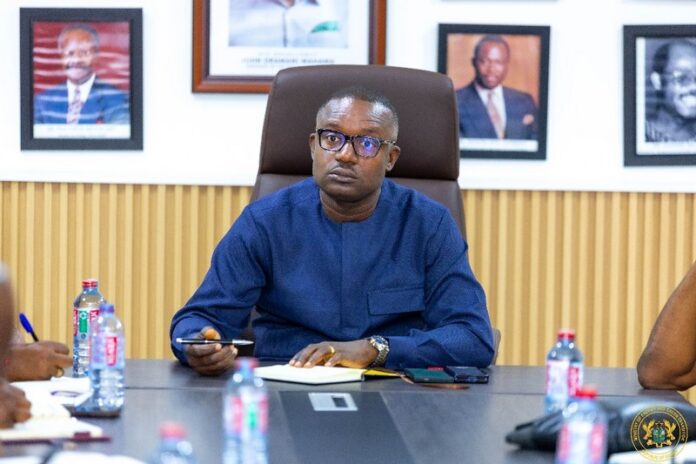Minister for Energy, John Jinapor, is vowing a crackdown on Ministries, Departments and Agencies (MDAs) that owe the Electricity Company of Ghana (ECG), warning that they risk being disconnected if they fail to pay their debts.
Speaking to members of the Energy Committee of Parliament, Mr Jinapor revealed that debts owed by state agencies have reached alarming levels, with the Ghana Water Company Limited singled out for failing to pay even a cedi in the past seven months.
“Yesterday [Wednesday], I was listening to a news item where Ghana Water made a complaint that, because of some erratic power situation, they are unable to supply adequately. I empathise with them. And I think that what we’ve inherited, we should improve. But the other note is that Ghana Water hasn’t paid even one cedi for seven months,” he said.
The Minister stressed that ECG must collect the monies owed if the power sector is to be stabilised.
“If you don’t pay one cedi for seven months and it adds up to one billion, the power sector will not be stable. The private sector or ordinary citizens alone cannot be called upon to shoulder the burden. The water is produced, and the water is sold. ECG must collect the money. And as minister, I will insist that ECG should collect the money.
The taxpayers’ money should not be used to subsidise ECG’s inability to collect the money. Ghana Water must collect its money. It sells the water. I consume water, I pay for it. I consume electricity, I pay for it. This is the only way we can bring about efficiency and turn the sector around,” he stated.
He explained that Cabinet has approved guidelines to identify and exempt only a few essential services from disconnection, and even those will be limited to key functions.
“Cabinet has also adopted a position—and we’ll brief you, chairman—that all MMDAs are supposed to pay for their electricity bills. They have to budget for it. We’ve identified what we call critical institutions. They include the health sector, the education sector, the security agencies, and the presidency.
So, if you take the health sector, it’s the theatres, laboratories, and wards that will be exempted. For educational institutions, dormitories are not included, nor are restaurants—only lecture theatres. We’ve classified all that, and Cabinet is granting approval and will publish it. Even for what we term as critical institutions, the Minister of Finance will have to budget for it and pay,” Mr Jinapor explained.
The Minister also shared insights from his recent engagements at the Offshore Technology Conference (OTC), where Ghana attracted interest from major oil players.
“In the petroleum sector, I was with some of your colleagues at OTC. We had a very good time. We met Exxon—they’ve expressed interest in coming back. We met other companies. They’ve all expressed interest. Cosmos and the Jubilee Partners have indicated they want to spend $2 billion in the sector. Eni has also indicated that they want to spend about $2 billion,” he said.
Mr Jinapor said the government is working on reforms to the Petroleum Exploration and Production Act to make the sector more attractive to investors.
“We’re going to bring to Parliament some reforms in respect of the Petroleum Exploration and Production Act, Act 919, to make it more attractive so that we can bring in people. Crude oil production is declining at a very fast rate, and we are worried about that. But I’m confident that we’ll be able to achieve all this and also reform the distribution sector, especially LICAN allocations,” he said.
He added that Cabinet has already approved a formula that will be formalised into law.
“Cabinet has approved some formula. We’ll put that into law and bring it to you. The last time I recall, we nearly passed the MPA Act. So we just need to tweak it. We don’t need to reinvent the wheel—bring it back and work on it,” he said.
ALSO READ:



